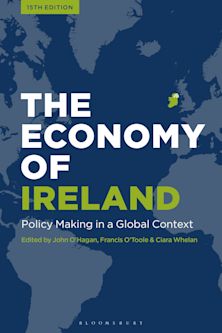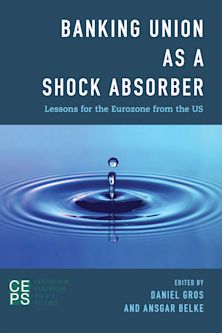- Home
- ACADEMIC
- Economics
- Economics - Other
- Towards Market Economies
Towards Market Economies
The IMF and the Economic Transition in Russia and Other Former Soviet Countries
Towards Market Economies
The IMF and the Economic Transition in Russia and Other Former Soviet Countries
This product is usually dispatched within 3 days
- Delivery and returns info
-
Free US delivery on orders $35 or over
You must sign in to add this item to your wishlist. Please sign in or create an account
Description
The book is about economic developments and policies in the first decade or so after the independence of the fifteen countries that emerged from the dissolution of the Soviet Union in 1991. From 1992 to 2003, the author was in charge of the IMF’s work on the fifteen countries that emerged from the former Soviet Union. In those years, the countries were beginning the transition from the Soviet central planning system towards market economies. The book focuses on the role of the IMF in this transition. It explains what the IMF was trying to do and why.
Table of Contents
List of Abbreviations
Preface
Chapter 1: The Hammer and Sickle
Chapter 2: Fifteen New Flags
Chapter 3: Stop Doing Whatever You Were Doing Before
Chapter 4: Russia: It Turned Out as Always
Chapter 5: Ukraine: Someday We Will
Chapter 6: The Baltic States
Chapter 7: Other CIS Countries
Chapter 8: A Longer Perspective
Further Reading
IMF Works
Other Works
About the Author
Product details
| Published | Sep 09 2022 |
|---|---|
| Format | Paperback |
| Edition | 1st |
| Extent | 248 |
| ISBN | 9780761873624 |
| Imprint | Hamilton Books |
| Illustrations | 14 b/w photos; |
| Dimensions | 9 x 6 inches |
| Publisher | Bloomsbury Publishing |
About the contributors
Reviews
-
The style of the book is calm and reasoned. The author does not defend the IMF or himself, but does suggest what might have been done differently—maybe not by the IMF, but by the countries in transition. He shows how deep political weakness—above all, corruption and cronyism— prevented the growth of real market economies
Finance and Development
-
John Odling-Smee headed the IMF Department for the former Soviet Union from 1992-2003. In this easy and pleasant memoir with many insights and astute judgment, he guides us through truly historical events. More than any other writer, he tells us what the IMF actually did and the limitations of what it could do in the transition of the former Soviet Union. Rather than defending the IMF or himself, Odling-Smee contemplatively discusses what could possibly have been done differently. On the way, he offers many pertinent observations about how terrible the initial situation was, how few early decisionmakers understood market economics or the outside world, but he also has a good eye for the heroes.
Anders Åslund, worked as an advisor to the Russian government, 1991-94, and to the Ukrainian government, 1994-97
-
The decade following the break-up of the Soviet Union into 15 new countries was critical in shaping our world. Many of the challenges we now face have their origins in that period. The IMF played a central role in the developments that followed and John Odling-Smee was the leading figure in the IMF. John is an outstanding economist and a person of calmness and authority, greatly respected by all who know him. I watched, and collaborated, in my role as Chief Economist of the European Bank for Reconstruction and Development at that time. Learning from his experiences and assessments is of great importance to us all and he writes in a very thoughtful and instructive way. This is an important and fascinating book and offers deep understanding of both history and our times.
Lord Nicholas Stern, CH, Kt, FBA, FRS, IG Patel Professor of Economics and Government,Chair, Grantham Research on Climate Change and the Environment, London School of Economics
-
Not many people in the former Soviet Union countries know how complicated it was to build a market economy in the 1990s and what role the IMF played. Odling-Smee vividly describes how it all happened and notes unique subtleties and nuances that only he could explain. I do not doubt that the book will be an excellent guide for a wide range of readers, including professional economists, financiers, and historians.
Djoomart Otorbaev, Prime Minister of Kyrgyzstan, 2014-15
-
As a senior IMF official, John Odling-Smee was intimately involved in the reform of the countries of the former Soviet Union in the 1990s. In this fascinating book, he explains how macroeconomic stability was established, albeit with ups and downs along the way. But he also shows how deep political weaknesses - above all the pervasive corruption and cronyism - prevented the creation of thriving and competitive market economies in nearly all the successor states. This is ultimately a story of failures. We are living with the consequences of these failures today.
Martin Wolf, Senior Economics Commentator, Financial Times
-
This book provides a clear and persuasive documentation of the role of the International Monetary Fund in the transformation of planned economies. But it is much more than that: it constitutes an essential guide to the big debates of the 1990s, including the question of “who lost Russia?”
Harold James, Claude and Lore Kelly Professor in European Studies at Princeton University and Professor of History and International Affairs at the Woodrow Wilson School

ONLINE RESOURCES
Bloomsbury Collections
This book is available on Bloomsbury Collections where your library has access.


































